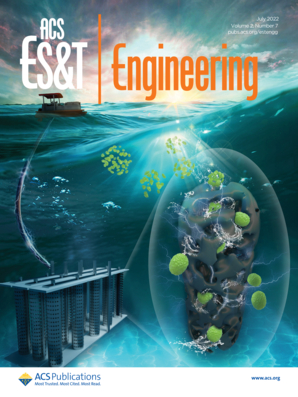Mass Transfer Mechanisms and Decolorization Kinetics of the Mixed Azo Dyes
IF 7.4
Q1 ENGINEERING, ENVIRONMENTAL
引用次数: 0
Abstract
The treatment of dye-contaminated wastewater using granular sludge was evaluated to ensure an effective design process for biogranulation technology. The investigation of dye-contaminated wastewater treatment in a sequencing batch reactor (SBR) aimed to understand the decolorization of mixed azo dyes (MAD) mediated by aerobic granular sludge (AGS) and magnetic-activated carbon aerobic granular sludge (MACAGS). The applicability of Generalized Fulazzaky equations was expanded to predict the mechanisms and kinetics of global, external, and internal mass transfer. The performance of SBR in decolorizing MAD with AGS and MACAGS reached 65.04% and 82.32% efficiency, respectively, exhibiting an increased efficiency of 17.28% (82.32–65.04%) with the presence of magnetic-activated carbon (MAC) in the formation of AGS. A trend in the variation of the internal mass transfer factor was similar to that of the global mass transfer factor and was far higher than that of the external mass transfer factor, indicating that the rate-limiting step of MAD decolorization was dependent on the resistance of external mass transfer. An analysis of the decolorization efficiency based on the internal mass transfer factor provided new insights into the role of MAC in enhancing the SBR performance, contributing to the advanced treatment of dye-contaminated wastewater.

混合偶氮染料的传质机制和脱色动力学
对使用颗粒污泥处理受染料污染的废水进行了评估,以确保生物发酵技术的有效设计过程。在序批式反应器(SBR)中处理染料污染废水的研究旨在了解好氧颗粒污泥(AGS)和磁性活性炭好氧颗粒污泥(MACAGS)对混合偶氮染料(MAD)的脱色作用。广义 Fulazzaky 方程的适用范围扩大到预测全局、外部和内部传质的机制和动力学。采用 AGS 和 MACAGS 的 SBR 对 MAD 的脱色效率分别达到了 65.04% 和 82.32%,在 AGS 的形成过程中加入磁性活性炭(MAC)后,脱色效率提高了 17.28%(82.32-65.04%)。内部传质因数的变化趋势与全局传质因数相似,且远高于外部传质因数,这表明 MAD 脱色的限速步骤取决于外部传质的阻力。基于内部传质因数的脱色效率分析为 MAC 在提高 SBR 性能方面的作用提供了新的见解,有助于染料污染废水的先进处理。
本文章由计算机程序翻译,如有差异,请以英文原文为准。
求助全文
约1分钟内获得全文
求助全文
来源期刊

ACS ES&T engineering
ENGINEERING, ENVIRONMENTAL-
CiteScore
8.50
自引率
0.00%
发文量
0
期刊介绍:
ACS ES&T Engineering publishes impactful research and review articles across all realms of environmental technology and engineering, employing a rigorous peer-review process. As a specialized journal, it aims to provide an international platform for research and innovation, inviting contributions on materials technologies, processes, data analytics, and engineering systems that can effectively manage, protect, and remediate air, water, and soil quality, as well as treat wastes and recover resources.
The journal encourages research that supports informed decision-making within complex engineered systems and is grounded in mechanistic science and analytics, describing intricate environmental engineering systems. It considers papers presenting novel advancements, spanning from laboratory discovery to field-based application. However, case or demonstration studies lacking significant scientific advancements and technological innovations are not within its scope.
Contributions containing experimental and/or theoretical methods, rooted in engineering principles and integrated with knowledge from other disciplines, are welcomed.
 求助内容:
求助内容: 应助结果提醒方式:
应助结果提醒方式:


